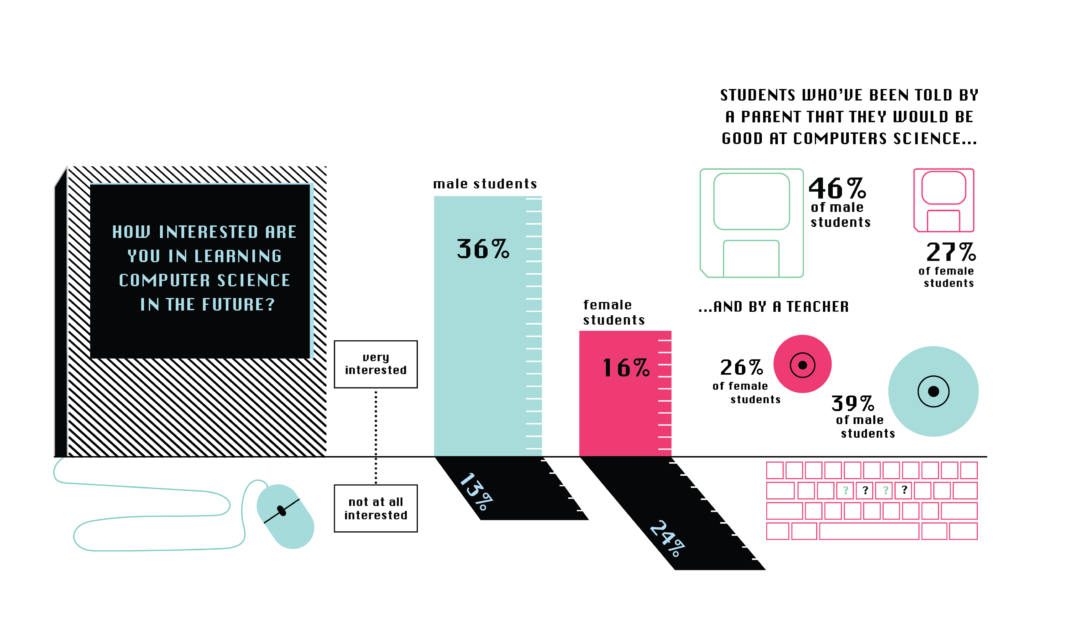The National Science Foundation has awarded Portland State Associate Dean of Engineering and Computer Science James Hook and his collaborators $1 million to train high school teachers how to diversify their computer science classrooms.
Computer Science for Oregon, a collaboration between PSU, University of Oregon, and Tigard-Tualatin School District, will train and coach local high school teachers in the Exploring Computer Science program. By introducing students to CS with real-life problem solving and algorithm design rather than beginning with computers and programming, the program hopes to reach students who are excited about CS but less likely to have already had exposure to these elements.
“[ECS] encourages teamwork and communication from day one and focuses students on critically analyzing information, actively sharing their thoughts, and reflecting upon their learning,” Hook explained. “These approaches to teaching and learning are attracting and retaining more non-traditional students.”
Hook said white males are disproportionately exposed to computer technology and encouraged to pursue CS from a young age, making them more “preparation privileged” than other students.
As a result, Hook explained, by the time these students take an official CS class in high school, “you get this both wonderful and terrible interaction between the enthusiastic, over-prepared, privileged student and the teacher.” This interaction, Hook added, might accidentally exclude other students.
The CSO program will involve a one-week intensive course in the summer, quarterly check-ins throughout the school year, and then another one-week intensive course the following summer. These intensives will mix first- and second-year teachers. Hook said this labor-intensive approach is necessary to permanently change behavior in the classroom.
University of Oregon Associate Professor Joanna Goode originally developed the ECS curriculum for the Los Angeles Unified School District. In its nine-year tenure, the program has increased participation of female and minority students, allowing CS classrooms to reflect LA’s actual demographics.
In the 2016–17 school year, LA ECS students were 83 percent Latinx, five percent white, six percent Black, five percent Asian, one percent other and 44 percent female. ECS has now expanded across the country and into Puerto Rico.
As of 2014, only 18 percent of CS college majors were women. At PSU, freshmen declaring science, technology, engineering and mathematics majors do not represent Portland’s demographics. “We’re seeing an over-representation of white and Asian males,” Hook said. He added that male students also tend to stick with the STEM major longer than female students.
Additionally, according to a 2016 joint Google and Gallup study, parents and teachers are far less likely to tell female students they would be good at computer science than they are to tell male students.

By teaching CS through real-world problems and without the need for computers, Hook said he hopes the ECS curriculum can level the playing field between students who have been exposed and encouraged to pursue CS and those who have not.
The ECS practices, according to Hook, are partly based on a set of exercises developed in New Zealand called CS Unplugged. Instead of learning how to make algorithms on a computer, students start by sorting objects like paper bags filled with different weights, then work in small groups to come up with a sorting algorithm, then come together to compare answers and possibly try again.
“This is how problem solving and computer science works,” Hook said.
Jill Hubbard, a Tualatin High School teacher trained as a computer engineer, is one of Hook’s collaborators. She also led the high school’s first year of teaching the ECS curriculum.
“As students enter high school, they often think it’s too late to participate in technical classes,” Hubbard wrote in an email. “Offering a broad, inclusive class intentionally designed to include pedagogy and content that speaks to a broader group of students is imperative for our students’ future career options as well as the prosperity of our communities, region, and the state.”
Hook agreed that exposing traditionally underrepresented populations to CS is necessary for them to benefit from the economy.
“I have come to view access to CS information as really an equity issue,” Hook said. “If you don’t have access to this information, you can’t really participate as a member of society fully anymore.”







what? No prep courses to get men into gender studies? How sexist.
And racist.
Latinx is incorrectly used here. Latinx refers to Latinos of third or other gender (in other words, not a Latino/male or Latina/female.
Thanks for your comment, Jenny.
The term Latinx is used in this article (“LA ECS students were 83 percent Latinx”) as an inclusive gender neutral term. Vanguard makes specific choices to use words, terms and descriptors reflecting people and communities’ preferred expressions of self-identification. This is particularly important when reporting on traditionally marginalized communities.
More on this:
How Wikipedia defines’ Latinx’
“What does ‘Latinx’ mean? A look at the term that’s challenging gender norms”
“Why I embrace the term Latinx”
PSU Latinx Institute for Public Service